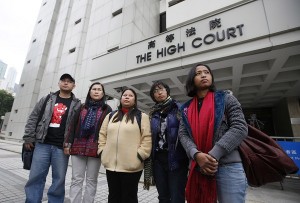
From left, Eman C. Villanueva, spokesperson of Asian Migrants’ Coordinating Body, Bungon Tamasorn, chairperson of Thai Regional Alliance in Hong Kong, Dolores T. Balladares, chairperson of United Filipinos in Hong Kong, Ganika Diristiani, representative of Association Indonesian Migrant Worker and Eni Lestari, spokesperson of Asian Migrants’ Coordinating Body, arrive at the High Court in Hong Kong Tuesday. Hong Kong's government is appealing a landmark court ruling last year opening the way for foreign maids to apply for permanent residency in a case that has divided the city over concerns about ethnic discrimination and strains on social services. AP
HONG KONG—Hong Kong’s government has argued against a landmark ruling that could let foreign maids gain permanent residency as it appealed a case that has raised concerns about ethnic discrimination and strains on social services.
In the ruling in September, a lower court judge found that an immigration provision denying foreign maids the right to apply for permanent residency after seven years — as other foreign residents can — was unconstitutional.
The case has divided Hong Kong, with some arguing that barring maids from applying for residency amounts to ethnic discrimination. Some groups fear the case will result in a massive influx of maids’ family members arriving in Hong Kong, putting a strain on the densely populated city’s social services and health and education systems, but supporters of the maids say those worries are unfounded.
On the first day of a scheduled three-day hearing, government lawyer David Pannick argued Tuesday that the court’s ruling was wrong because it places limits on lawmakers’ ability to decide who is eligible to permanently settle in Hong Kong.
The judge in Hong Kong’s Court of First Instance had found in favor of Evangeline Banao Vallejos, a Filipino woman who had worked as a maid in Hong Kong since 1986. Vallejos sought a judicial review after her bid for permanent residency was rejected.
Pannick rejected arguments by Vallejos’ lawyers that denying maids the right to apply for residency undermined the rule of law. He said the Basic Law, Hong Kong’s mini-constitution, was not intended to be a “straitjacket” that prevented lawmakers from having flexibility when setting immigration policies to advance Hong Kong’s interests.
“Our argument is that the concept of ‘ordinary residence’ allows for a measure of discretion by the legislature,” Pannick told a three-judge panel in Hong Kong’s Court of Appeal. According to immigration provisions, foreign maids in Hong Kong are not considered “ordinarily resident.”
Mark Daly, one of Vallejos’s lawyers, would not comment on the government’s position but said, “We’re quite confident in our arguments.”
There are about 292,000 foreign domestic helpers in Hong Kong, and most are women from the Philippines or Indonesia. Others come from Thailand, Nepal, India, Pakistan and Sri Lanka. About 95 percent of Hong Kong’s 7.1 million people are ethnically Chinese.
By the end of 2010, 117,000 of the city’s foreign maids had been in Hong Kong for more than seven years, the September ruling said, citing government figures.
Hong Kong permanent residents enjoy certain privileges including the right to vote and work without needing a visa.
A handful of protesters gathered outside the courthouse as the hearing began, chanting slogans in support of the government’s appeal. They held up a banner that said, “Protect Hong Kong people’s welfare.” One political party has estimated up to 500,000 dependents of the maids could settle in the city because of the ruling but Daly said those numbers were “exaggerated.”
The maids are a big help to Hong Kong’s middle-class families, who employ them to do household chores and look after children for a minimum wage of about $450 a month.

